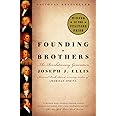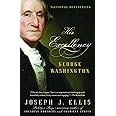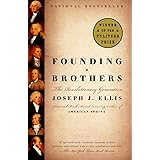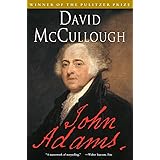
Download the free Kindle app and start reading Kindle books instantly on your smartphone, tablet, or computer - no Kindle device required.
Read instantly on your browser with Kindle for Web.
Using your mobile phone camera - scan the code below and download the Kindle app.

OK
 Audible sample Sample
Audible sample Sample 


American Sphinx: The Character of Thomas Jefferson Paperback – April 7, 1998
Purchase options and add-ons
For a man who insisted that life on the public stage was not what he had in mind, Thomas Jefferson certainly spent a great deal of time in the spotlight--and not only during his active political career. After 1809, his longed-for retirement was compromised by a steady stream of guests and tourists who made of his estate at Monticello a virtual hotel, as well as by more than one thousand letters per year, most from strangers, which he insisted on answering personally. In his twilight years Jefferson was already taking on the luster of a national icon, which was polished off by his auspicious death (on July 4, 1826); and in the subsequent seventeen decades of his celebrity--now verging, thanks to virulent revisionists and television documentaries, on notoriety--has been inflated beyond recognition of the original person.
For the historian Joseph J. Ellis, the experience of writing about Jefferson was "as if a pathologist, just about to begin an autopsy, has discovered that the body on the operating table was still breathing." In American Sphinx, Ellis sifts the facts shrewdly from the legends and the rumors, treading a path between vilification and hero worship in order to formulate a plausible portrait of the man who still today "hover[s] over the political scene like one of those dirigibles cruising above a crowded football stadium, flashing words of inspiration to both teams." For, at the grass roots, Jefferson is no longer liberal or conservative, agrarian or industrialist, pro- or anti-slavery, privileged or populist. He is all things to all people. His own obliviousness to incompatible convictions within himself (which left him deaf to most forms of irony) has leaked out into the world at large--a world determined to idolize him despite his foibles.
From Ellis we learn that Jefferson sang incessantly under his breath; that he delivered only two public speeches in eight years as president, while spending ten hours a day at his writing desk; that sometimes his political sensibilities collided with his domestic agenda, as when he ordered an expensive piano from London during a boycott (and pledged to "keep it in storage"). We see him relishing such projects as the nailery at Monticello that allowed him to interact with his slaves more palatably, as pseudo-employer to pseudo-employees. We grow convinced that he preferred to meet his lovers in the rarefied region of his mind rather than in the actual bedchamber. We watch him exhibiting both great depth and great shallowness, combining massive learning with extraordinary naïveté, piercing insights with self-deception on the grandest scale. We understand why we should neither beatify him nor consign him to the rubbish heap of history, though we are by no means required to stop loving him. He is Thomas Jefferson, after all--our very own sphinx.
- Print length440 pages
- LanguageEnglish
- PublisherVintage
- Publication dateApril 7, 1998
- Dimensions5.22 x 0.99 x 7.98 inches
- ISBN-100679764410
- ISBN-13978-0679764410
Frequently bought together
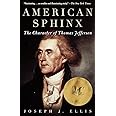
Similar items that may deliver to you quickly
Editorial Reviews
Review
“This elegant book on Jefferson sets a standard—history at its best.” —Chicago Tribune Editor’s Choice
“A brilliant, unconventional look at Jefferson … beautifully written, cogently argues, full of both zealous scholarship and lively imagination.” —Cleveland Plain Dealer
“Magnificent.… Ellis has a Jeffersonian gift for language.” —Newsweek
“Lively and provocative … first-rate.” —David McCullough
From the Inside Flap
For the historian Joseph J. Ellis, the experience of writing about Jefferson was "as if a pathologist, just about to begin an autopsy, has discovered that the body on the operating table was still breathing." In American Sphinx, Ellis sifts the facts shrewdly from the legends and the rumors, treading a path between vilification and hero worship in order to formulate a plausible portrait of the man who still today "hover[s] over the political scene like one of those dirigibles cruising above a crowded football stadium, flashing words of inspiration to both teams." For, at the grass roots, Jefferson is no longer liberal or conservative, agrarian or industrialist, pro- or anti-slavery, privileged or populist. He is all things to all people. His own obliviousness to incompatible convictions within himself (which left him deaf to most forms of irony) has leaked out into the world at large--a world determined to idolize him despite his foibles.
From Ellis we learn that Jefferson sang incessantly under his breath; that he delivered only two public speeches in eight years as president, while spending ten hours a day at his writing desk; that sometimes his political sensibilities collided with his domestic agenda, as when he ordered an expensive piano from London during a boycott (and pledged to "keep it in storage"). We see him relishing such projects as the nailery at Monticello that allowed him to interact with his slaves more palatably, as pseudo-employer to pseudo-employees. We grow convinced that he preferred to meet his lovers in the rarefied region of his mind rather than in the actual bedchamber. We watch him exhibiting both great depth and great shallowness, combining massive learning with extraordinary naïveté, piercing insights with self-deception on the grandest scale. We understand why we should neither beatify him nor consign him to the rubbish heap of history, though we are by no means required to stop loving him. He is Thomas Jefferson, after all--our very own sphinx.
From the Back Cover
For the historian Joseph J. Ellis, the experience of writing about Jefferson was "as if a pathologist, just about to begin an autopsy, has discovered that the body on the operating table was still breathing." In American Sphinx, Ellis sifts the facts shrewdly from the legends and the rumors, treading a path between vilification and hero worship in order to formulate a plausible portrait of the man who still today "hover[s] over the political scene like one of those dirigibles cruising above a crowded football stadium, flashing words of inspiration to both teams." For, at the grass roots, Jefferson is no longer liberal or conservative, agrarian or industrialist, pro- or anti-slavery, privileged or populist. He is all things to all people. His own obliviousness to incompatible convictions within himself (which left him deaf to most forms of irony) has leaked out intothe world at large--a world determined to idolize him despite his foibles.
From Ellis we learn that Jefferson sang incessantly under his breath; that he delivered only two public speeches in eight years as president, while spending ten hours a day at his writing desk; that sometimes his political sensibilities collided with his domestic agenda, as when he ordered an expensive piano from London during a boycott (and pledged to "keep it in storage"). We see him relishing such projects as the nailery at Monticello that allowed him to interact with his slaves more palatably, as pseudo-employer to pseudo-employees. We grow convinced that he preferred to meet his lovers in the rarefied region of his mind rather than in the actual bedchamber. We watch him exhibiting both great depth and great shallowness, combining massive learning with extraordinary naivete, piercing insights with self-deception on the grandest scale. We understand why we should neither beatify him nor consign him to the rubbish heap of history, though we are by no means required to stop loving him. He is Thomas Jefferson, after all--our very own sphinx.
About the Author
JOSEPH J. ELLIS is the author of many works of American history including Founding Brothers: The Revolutionary Generation, which was awarded the Pulitzer Prize; and American Sphinx: The Character of Thomas Jefferson, which won the National Book Award. He recently retired from his position as the Ford Foundation Professor of History at Mount Holyoke College and lives in Amherst, Massachusetts, with his wife and their youngest son.
Product details
- Publisher : Vintage (April 7, 1998)
- Language : English
- Paperback : 440 pages
- ISBN-10 : 0679764410
- ISBN-13 : 978-0679764410
- Item Weight : 12 ounces
- Dimensions : 5.22 x 0.99 x 7.98 inches
- Best Sellers Rank: #104,539 in Books (See Top 100 in Books)
- #111 in American Revolution Biographies (Books)
- #210 in U.S. Revolution & Founding History
- #318 in US Presidents
- Customer Reviews:
About the author

Joseph J. Ellis is Ford Foundation Professor of History at Mount Holyoke and author of the National Book Award-winning American Sphinx: The Character of Thomas Jefferson, the Pulitzer Prize-winning Founding Brothers, and The Passionate Sage (Norton).
Photo by Larry D. Moore [CC BY-SA 3.0 (http://creativecommons.org/licenses/by-sa/3.0) or GFDL (http://www.gnu.org/copyleft/fdl.html)], via Wikimedia Commons.
Customer reviews
Customer Reviews, including Product Star Ratings help customers to learn more about the product and decide whether it is the right product for them.
To calculate the overall star rating and percentage breakdown by star, we don’t use a simple average. Instead, our system considers things like how recent a review is and if the reviewer bought the item on Amazon. It also analyzed reviews to verify trustworthiness.
Learn more how customers reviews work on Amazon-
Top reviews
Top reviews from the United States
There was a problem filtering reviews right now. Please try again later.
Now, I don't need a book to agree with my every sentiment. I don't need an author to tell me I'm right. What I need from a book, about an already well-covered subject, is something new and something different. Sometimes I need to be shown the opposition. Ellis has made quite a handful of Jeffersonians upset with American Sphinx. It's not just because he claims that Jefferson's more radical beliefs were baseless, even though he often does categorize them as such, it is because Mr. Ellis makes a damn good argument to the popular contrary. He hasn't changed my views, not even in the slightest, but it wasn't his goal to try to change them at all. Jeffersonian readers need to come down off the defensive and allow for rationality to enter the realm of contemporary scholarship. The goal of Ellis was not to kick dirt on Jefferson's legacy. His goal was to analyze and inquire. His critical look at the foundation of American radicalism was a civil and welcome glance that was taken into kind consideration.
An eloquent book about principality and masks and several truths. In the words of it's author, "All I can say in my defense is that the subject of the chapters that follow, while great, is not a statue".
Ellis's biography of Thomas Jefferson is not as good a book as "Founding Brothers". I am not a big reader of biographies, so that may be part of it, but there is less content here than in "Founding Brothers". The latter book is shorter and has a wider scope, and for the most part, the more in debt look on Jefferson doesn't give comparable insight.
But "American Sphinx" is a very, very good book. We encounter Jefferson in five periods of his life: Drafting the Declaration of Independence in Philadelphia, watching the burgeoning French Revolution while trying in vain to promote American interests in 1780s Paris, Congealing the Anti-Federalist opposition from his rectitude in Monticello, Mastering American destiny in his first term as President of the United States, and Spending his last years in retirement, debt, and construction of the University of Virginia from 1816 to 1826.
In all of the chapters, Ellis avoids strict chronology for a theme based approach, discussing political event (his opposition to Federalism, the Louisiana purchase), personal life (his did-they-or-didn't-they romance with Maria Cosway, quarrels and friendship with John Adams, and of course, the Sally Hemings scandal), interests (primarily architecture), and political philosophy (strangely Whiggish and unrealistic).
I think the Jeffersonian Mind, as described by Ellis, is the most extraordinary element of his character. Some people held Jefferson to be a hypocrite, adapting his message to different audiences. Ellis, though, sees it as a capacity for self delusion. Jefferson had a "deep distaste for sharp disagreement and [a] bedrock belief that harmony was nature's way of signaling the arrival of truth" (p. 106). This capacity for self delusion allowed him to lead a political party while claiming that "If I could not go to heaven but with a party, I would not go there at all" (quoted on p. 124), it allowed him to deny having hired James Callander to character assassinate John Adams, even as he did exactly that, and most famously of all, it effected his treatment of slavery.
The counterpoint of Jefferson dislike of argument was that he saw a great dichotomy between those on his side and the other side. Jefferson saw the world in moral absolutes, the constant clashes of Good vs. Evil, with himself conveniently on the side of the angels. Fighting George III's despotism and opposing the Federalists was part of the same struggle - of the "Pure Republicans" against the consolidationist, aristocratic monarchists. That was always a strange position for the Aristocratic Jefferson to adopt, and always only tenuously connected with reality - but never less so then in his final years, when he had to cast in the role of the enemies the Northern opposers of the expansion of slavery.
Jefferson managed to do just that. Although he had proposed abolition of slavery throughout the territories of the Unites states back in the 1780s, and although he was responsible for the Louisiana purchase of 1803, Jefferson nonetheless saw the Missouri Crisis as a "fire bell in the night" (quoted on p. 306). New York Congressman James Tallmadge's proposal to prohibit slavery in Missouri as a condition for its admission as a state was merely a "party trick". Northern politicians cynically took "advantage of the virtuous feelings of the people" as a new cover in the quest for power, consolidation and despotism. The angels were on the side of the lash.
For me, one of the most intriguing things of Jefferson is this image - Jefferson the genuine radical, who could sincerely maintain his cherished illusions regardless of reality. Of all the Founding Fathers, Ellis, suggests, Jefferson was the most radical one, believing in the true exercise of popular democracy, and of an eternal struggle between Good and Evil, of which he was the ultimate judge. This is the Jefferson who boldly states: "The tree of Liberty must be refreshed from time to time with the blood of patriots and tyrants" (on p. 118).
For all of its egalitarian and radical potential, the American Revolution was headed by pragmatic and practical leaders who led it towards stability and triumph. But neither in temperament nor in thinking was Jefferson one of them. Had he been born in another time, at another place, would Jefferson have been not an American Sphinx, but an American Lenin?
Top reviews from other countries
The title "The character of Thomas Jefferson" is slightly misleading as Jefferson's political philosophy and how it was rooted in his personality and influenced his political actions and decisions is the actual subject of the book. Being already familiar with the basic facts of Jefferson's life appears to be a useful requisite for reading it.




